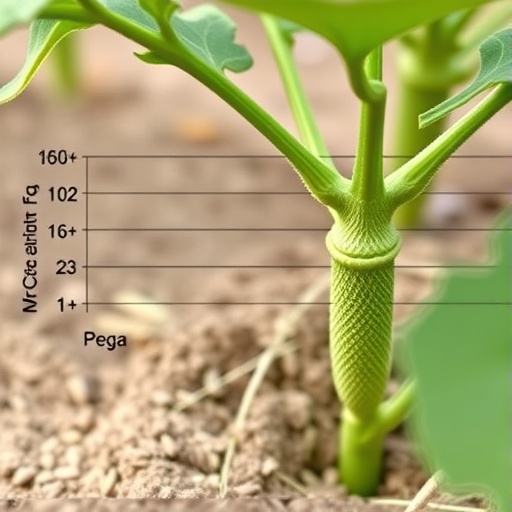In a groundbreaking study published in the journal “Discover Plants,” researchers have extensively examined the effects of osmopriming with polyethylene glycol (PEG) 6000 on seed germination and early seedling establishment in okra, scientifically known as Abelmoschus esculentus. This innovative approach aims to enhance the viability and resilience of okra seeds, a staple crop with significant nutritional and economic importance, particularly in developing countries. The implications of improving germination and seedling establishment are profound, as they could lead to increased yields and more robust farming systems in challenging environments.
The research team, comprised of Fomekong, Tchouake Tetang, and Temegne, focuses on the interaction between seed pre-treatment methods and environmental stressors that often inhibit seed germination. Traditional agricultural practices frequently face challenges such as drought, salinity, and unexpected climatic variations, reducing the potential for successful crop cultivation. By investigating the osmopriming technique, the researchers aim to offer farmers a reliable method to enhance germination rates significantly, contributing to food security.
Osmopriming, which involves soaking seeds in a solution of osmotic agents like PEG, stimulates various physiological mechanisms within seeds. This technique is designed to precondition seeds, easing the awakening process and facilitating a more synchronized and vigorous germination. The use of PEG 6000 specifically allows for controlled water uptake and mitigates osmotic stress, a common challenge seeds encounter during the germination process. This research underscores the potential of osmopriming not just as a laboratory technique but as an accessible tool for farmers worldwide.
One of the key findings of this study is the marked improvement in germination rates among osmoprimed seeds compared to non-primed controls. The researchers reported that seeds treated with PEG 6000 showed a more rapid and uniform emergence, which is critical for establishing a healthy crop stand. This uniformity is particularly crucial in agricultural settings where competition for resources can lead to significant yield variability, making it a potential game changer in crop production strategies.
Furthermore, the study meticulously examines the physiological parameters associated with germination and seedling growth. Enhanced water uptake and the activation of metabolic processes were measured and correlated with improved seedling vigor post-germination. This correlation reinforces the role of osmopriming in optimizing seed performance under variable environmental conditions. The comprehensive nature of these findings emphasizes the importance of integrating scientific research into practical agricultural solutions.
In addition to germination benefits, osmoprimed seeds exhibited improved early seedling establishment characteristics, which include root development and biomass accumulation. This phase of growth is critical, as strong roots allow for better nutrient and water uptake, directly influencing the plant’s resilience to drought and nutrient-poor soils. The results from this study could lead to a paradigm shift in how okra is cultivated, especially in regions prone to climatic extremes.
Notably, the implications of this research extend beyond okra cultivation. The principles of osmopriming could be adapted and applied to a variety of crops facing similar cultivation challenges. The methodology could provide a way for farmers to enhance their crop’s resilience to changing weather patterns, ultimately contributing to greater agricultural sustainability. The versatility of osmopriming could thus pave the way for advancements in agronomy and food production.
The researchers also acknowledge the growing interest in sustainable agricultural practices and how techniques such as osmopriming align with these values. By reducing the reliance on chemical inputs and promoting natural growth processes, osmopriming serves as a method that is both environmentally friendly and effective. The relevance of this study is further amplified by global initiatives aimed at increasing agricultural productivity while simultaneously addressing climate change impacts.
As the findings make waves through the scientific community, agricultural stakeholders are encouraged to explore the practical applications of osmopriming in their local contexts. Workshops and farmer training sessions focusing on these techniques could be beneficial in transferring knowledge from the laboratory to the field. Engaging with farmers and agricultural extensions is crucial for ensuring that research translates to actionable practices that can improve crop production sustainably.
Moreover, the collaboration between researchers and agricultural communities could foster innovation, leading to the development of region-specific priming protocols tailored to local environmental conditions. This cooperative approach could enhance the adoption of osmopriming strategies and support collective efforts toward achieving food security and agricultural resilience worldwide.
In conclusion, the research conducted by Fomekong, Tchouake Tetang, and Temegne stands as a testament to the potential for science to solve real-world agricultural challenges. The findings encourage a shift towards enhanced seed management practices that utilize osmopriming to improve growth outcomes, thereby reinforcing the foundational role of research in fostering agricultural innovation. As we face an uncertain agricultural future, it is imperative that such studies continue to inform and inspire strategies aimed at sustainable and productive farming.
Maintaining a research focus on crop resilience and seed performance will undoubtedly contribute to global efforts against food insecurity. The promising results demonstrated through this study not only benefit farmers in their immediate agricultural pursuits but also serve as crucial stepping stones towards a more stable, secure future for global food systems.
Subject of Research: Osmopriming with PEG 6000 on seed germination performance and early seedling establishment in okra.
Article Title: Effect of osmopriming with PEG 6000 on seed germination performance and early seedling establishment in okra (Abelmoschus esculentus (L.) Moench).
Article References:
Fomekong, M.K., Tchouake Tetang, E.F., Temegne, C.N. et al. Effect of osmopriming with PEG 6000 on seed germination performance and early seedling establishment in okra (Abelmoschus esculentus (L.) Moench).
Discov. Plants 2, 292 (2025). https://doi.org/10.1007/s44372-025-00376-0
Image Credits: AI Generated
DOI:
Keywords: Osmopriming, PEG 6000, seed germination, okra, agricultural innovation, crop resilience, food security.
Tags: Abelmoschus esculentus researchagricultural practices in developing countriesenhancing seed viability and resilienceenvironmental stressors on seed germinationfood security and crop yieldsimpact of osmotic agents on agriculture.innovative farming systemsokra seed germination improvementovercoming drought and salinity stressPEG 6000 seed osmoprimingphysiological mechanisms in seed germinationseed pre-treatment techniques





